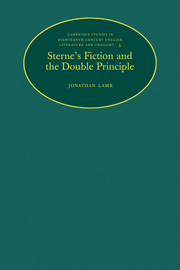1 - Scepticism, Job and the double principle
Published online by Cambridge University Press: 05 February 2012
Summary
There is a set of sceptical commonplaces announced and exemplified in Sterne's fiction which I want to begin by enumerating. They are not especially new or interesting in themselves, but they foster experiments in characterisation, narrative and aesthetics which I hope are interesting because they are the subject of the following book.
Propositions and illustrations
A collection of these commonplaces, neatly summarising the assumptions of Sterne's favourite authors (especially Montaigne), is found in Hume's essay ‘The Sceptic’ (1741). There he maintains that all judgments about things are unstable because the value of a thing is not determined by any immutable quality belonging to it, but by the extremely varied responses it will induce in the people who encounter it. This variety is owing both to the different situations in which things may be found and to the different moods in which they will be viewed. Discourse of reason will never bring people to a consensus about things because their impressions of them (variously named sentiments, passions and tastes) are not susceptible to rational discrimination, only to the accidents, intuitions, habits and prejudices which are constantly forming and re-forming them. Hume draws two conclusions. The first is that there is never any clear relation between perceptions and things, since perceptions are neither consistent nor continuous, and since the notion of a continuous identity of things is an illusion persisting in spite of the various and interrupted views we have of them. The second is that no language will affect these perceptions which does not itself participate in the mixed cases it addresses.
- Type
- Chapter
- Information
- Sterne's Fiction and the Double Principle , pp. 6 - 30Publisher: Cambridge University PressPrint publication year: 1989



